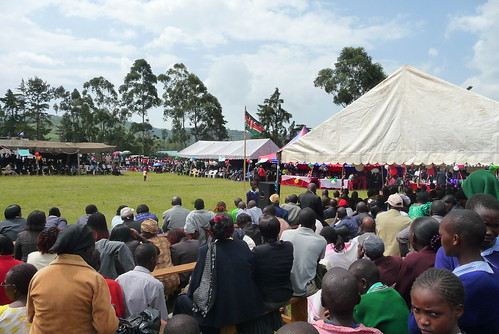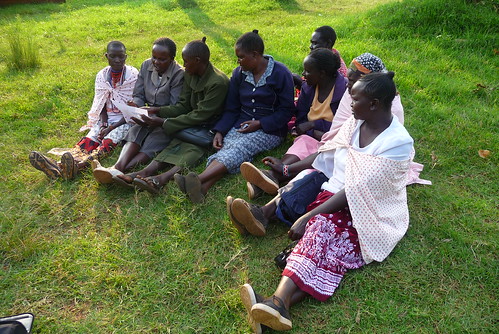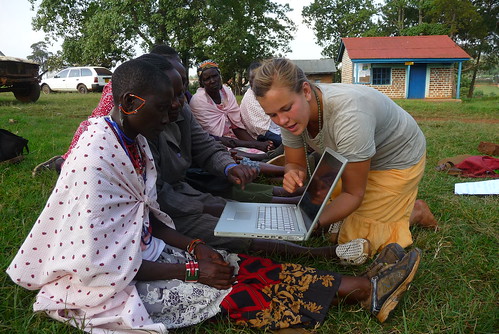I have been in Enoosaen for two weeks already. Apart from the time we have spent in Kilgoris, the nearby “town”, I have mostly been at the village. As the days go by here in Enoosaen, I learn more and more the value of patience. The pace of life is clearly different than the one I am used to, and the people here function on a time clock of their own. Meetings will start when people show up, not necessarily when you schedule them; cars will leave when all the seats are taken, not at a certain time. It takes some adjustments, but I am learning that once you stop trying to control time and adjust your expectations accordingly, you will have a more pleasant experience. It does make planning difficult, and a lot of our work here depends on planning, but it does not mean that things will not get done. Charlotte has been great in imparting this knowledge, but it is something you can only really learn on your own.
We have discussed what projects need to be completed during my time here, and these are the ones we will be concentrating our efforts on in the upcoming weeks: to conduct a needs assessment research with the girls’ families in order to understand the demographics we are directly reaching with the school; to conduct a background research with key schools in the area in order to have a better idea of what are our strengths and weaknesses when compared to them; to work on a quilt project with the girls and with a local widows group to learn more about their personal stories (storytelling through pictures); to teach the girls IT skills through computer lessons; and to continue interviewing key people in the local fight against FGM/early marriage. All of these depend on other people’s time, so our plans/schedule can always change, but we will be working on them concomitantly, and as these projects progress we will be sharing more about them in our blogs.
These, of course, are not the only projects we will be working on, and we have discussed what other activities we could do with the girls. Charlotte and I agree on the need to strengthen their English skills, so we decided to hold a spelling bee contest at the school – more on this in the future!
After this general update, I want to highlight two events. Last Friday we participated in the Academic Day held in Kilgoris. As I understand, this was an event to celebrate the best schools in the division, and there seemed to be a huge attendance. However, what is important to note here is that the Transmara district is known for having an overall poor performance, and we were verbally informed during the event by a head teacher sitting next to us that the Kilgoris division as a whole placed 162nd amongst the 246 divisions in Kenya. As we sat there and listened to the officials congratulate each other, we could not help but question whether or not some self-reflection on their poor overall performance was also done. It is great to reward accomplishments, but these accomplishments should be contextualized. And although I could not verify the exact placement information that the teacher gave us, I was able to confirm an even more appalling statistic: out of the 100 best secondary students in the country in the 2010 national examination, only 22 were girls!
On a much more positive note, we had the first meeting with the widows group to discuss our quilt project with them. This group, called Rehema (“compassion” in Swahili), was started in 2006 and its main purpose is to serve as a forum for the local widows to discuss their hardships, but also to educate them about their rights. At first the idea was to only work with the girls at KCE, but Mama Kakenya is a part of this group and had already mentioned it to Charlotte, who thought that working with them would complement the work with the girls. Working with Rehema makes the project more special, because with this group we can really explore the challenges of being a woman in the Maasai culture.
Part of the AP’s activity with the partner organization is to have them work on a quilting project. This tool for storytelling is very effective for several reasons: it is a therapeutic activity, it is a great mean for self-expression, it presents a visual complement to their already compelling stories, it can be later used as an advertizing tool for the organization, etc. To make this project more personal, the women (and also the girls at KCE) will work on their quilts by using the ancient Maasai tradition of beading.
After explaining to them the reason behind quilting and why we think they would be a great group to work with, the women sounded really excited about the project and already started talking about possible stories to portrait on their panels. We will meet with them again this week, and hopefully more positive results will come from our next meeting!
Posted By Cleia Noia
Posted Jun 21st, 2011






2 Comments
Amy
July 20, 2011
Yeah! Maasai beads on a quilt, what a cool idea! Can’t wait to see.